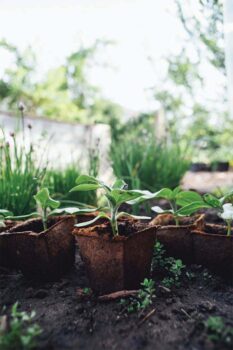
Seedlings
Back to the Garden: Seeds for Global Gardens
Sheilah Britton, Pinal County Master Gardener
I’ve just purchased $30 worth of seeds to plant in the small bins at SaddleBrooke Ranch’s Community Garden and, as an experiment, I intend to catalog and keep a daily journal of its progress and success to be followed up with a report at the end of the summer.
While this might seem like a simple plan, I’ve upped the ante by choosing rare seeds that I’ve never planted before. I’ve also never planted a garden from seeds.
Before I moved from Arizona to California 10 years ago, I had never planted a garden. The home I purchased in Sonoma County had a bounty of trees, bushes, and luscious flowers that delighted me in every season. I had lemons, Asian pears, a guava bush, jasmine, lilies, roses, daffodils, irises, lavender, and hyacinths. After a couple of years, I bought wine barrels and planted tomatoes, basil, cilantro, thyme, oregano, parsley, rosemary and dill. Everything grew and thrived. It was exhilarating.
When I moved to the Ranch two and a half years ago, I was determined to garden, if only with herbs, flowers, and native plants. Two months after I moved here, I joined the Master Gardener training program and became a certified Master Gardener, which meant I was beginning to learn to garden in the desert.
There are challenges. Our caliche soil has to be amended heavily. Summers can be brutally hot. Monsoons are fickle and sometimes don’t show up at all. And the winds have taken every blossom from all three of my citrus trees before they ever had a chance to become fruit. Still, we persist, and with some success we gain confidence and even begin to experiment.
I have a raised bed in my backyard and two shared bins at the Community Garden. In the past, I’ve always planted starter plants that were grown in local soil near my home. For the past couple of years I’ve purchased starter plants at farmers markets and from the plant sales at the Oracle Community Garden. All of those plants have done well.
But I was gifted with an heirloom seed catalog a few weeks ago and decided it was time to try something new. Seed catalogs can be daunting if you find only names of plants and prices. But there are a number of glorious catalogs with beautiful, vibrant photographs and detailed descriptions of the seeds’ history, where they originate, testing, standards, and germination rates.
So my garden this year will include Tankuro edamame from Japan—considered to be one of the essential “five sacred grains,” along with rice, wheat, barley, and millet. I’ve chosen a Ruby Queen beet since it promises to perform well even in poor soil. The Push Asita Carrot from India caught my eye with its deep purple hues and promises to perform well in extreme heat. Foeniculum vulgare, or Florence fennel, is a favorite of mine for Italian dishes. And from closer to home, I’ll plant the Rio Grande Verde tomatillo for Mexican sauces and salsas.
I’m hoping by the end of summer, the world will be growing in my garden.
SaddleBrooke/SaddleBrooke Ranch Master Gardeners are volunteers trained under the auspices of the University of Arizona, Cooperative Extension, Pinal County. We offer educational programs and classes to residents of our communities. Need advice or have questions about your own garden? Send an email to planthelp@arizona.edu. Include your name, address, phone number, and photos of your issues. Please visit our website at extension.arizona.edu/saddlebrooke-master-gardeners.
Master Gardener Presentation March 17
Sheilah Britton, Pinal County Master Gardener
Your SaddleBrooke/SaddleBrooke Ranch Master Gardeners are pleased to invite you to attend an in-person presentation with Kathleen Prudic, PhD, an ecologist and professor in the School of Natural Resources and the Environment at the University of Arizona. Please join us on Thursday, March 17, at 1 p.m. in the East Ballroom at SaddleBrooke TWO for “Citizen Science and Conservation Take Flight in Butterflies.” Dr. Prudic will discuss her work with butterflies and the science platform that observes thousands of butterflies globally.
Dr. Prudic is an ecologist interested in understanding how climate change is impacting where, when, and how butterflies make a living and what we can do to help them through these changes. She is co-director of eButterfly (www.e-butterfly.org), an online citizen science platform that harnesses the observations of thousands of butterfly enthusiasts. Her research encompasses precision conservation, human-computer networks, and data science.
Contact Sheilah Britton with questions at sheilahlou@gmail.com.
